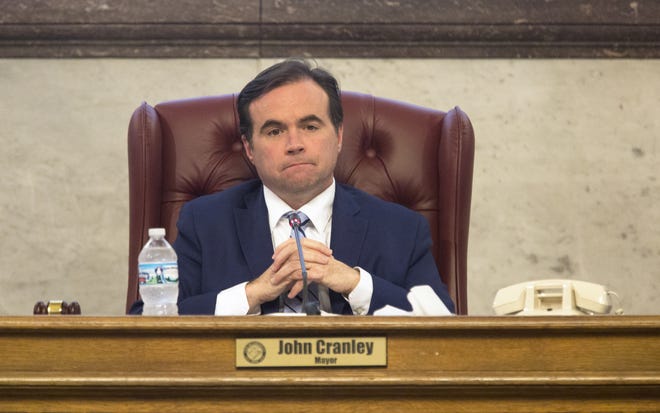

Hamilton County judges shot down Cincinnati Mayor John Cranley's bid to create a new housing court Tuesday, ending a years-long effort by the mayor and other officials to change the way the community deals with blight, foreclosures and other housing-related problems.
The county's common pleas judges, who along with the state legislature must approve the creation of a specialized court for housing, rejected the proposal in a 14-2 vote.
Cranley and some past and present City Council members have touted a housing court as the best way to combat abusive landlord practices, blight and abandoned properties. Some neighborhood leaders also have rallied behind the court as a tool to more easily tackle vacant or deteriorating homes.
City Manager Paula Boggs-Muething presented the city's plan to the judges last week and asked them to convert one of the existing 16 common pleas judgeships to a position that would exclusively oversee civil and criminal matters related to housing.
The judges, however, raised several concerns, which ultimately doomed the proposal.
Judge Melba Marsh, who opposed the plan, said some judges worried that a judgeship would be changed by a vote of the judges, rather than by a vote of the people. Others were concerned that the housing court would be in common pleas court rather than in municipal court, where a part-time housing docket already exists.

Common pleas courts handle the most serious criminal and civil cases and also impose the most serious penalties. Other Ohio housing courts that have been created in Franklin and Cuyahoga counties are based in municipal court, not common pleas.
"The judges felt very strongly because of different issues," Marsh said. "We didn't vote no for one reason."
Marsh said she was concerned the housing court could be used to more aggressively penalize people who are struggling to keep their homes in good repair.
The best-known such case involved the Rev. Peterson Mingo, a Cincinnati pastor and city employee who was handcuffed and briefly jailed in 2017 for failing to fix a retaining wall in his yard. He said the repairs would cost up to $10,000, which he couldn't afford.
Marsh said she found several examples from municipal court's housing docket in recent years involving homeowners who faced criminal charges and later sold their homes at rock-bottom prices rather than risk continued building code violations.
She said she also was concerned that neighborhoods that developers find more desirable could be disproportionately targeted for building code violations, which typically are levied only after the city receives a complaint about a potential problem. If homeowners in those neighborhoods are pushed out, Marsh said, it would clear the way for developers to move in.
"There's no reason to penalize people because they can't afford to fix up their house," Marsh said. "Poverty has become a criminal offense."
In a statement after the vote Tuesday, Cranley said he believes residents in counties that have approved housing courts are now better protected against abuses, not at greater risk. "Our residents deserve the same level of protection," Cranley said.
He also said the court could act on behalf of residents living in substandard affordable housing, a major issue in a city with as many renters as Cincinnati. An Enquirer investigation last year found Cincinnati has one of the largest per capita populations of renters among big cities in America, with renters accounting for 62% of all households. Of those, almost half are considered burdened renters because they pay almost one-third of their income on rent.
"Affordable housing also means enforcing humane living conditions, and housing courts have been proven to do that," Cranley said.
Judge Terry Nestor, a former assistant Cincinnati solicitor, said he supported the proposal because a specialized court could help direct homeowners to resources outside the court system. He currently runs a specialized docket for military veterans and said he's seen how well such a setup can work.
"I have a good idea of what a housing court could do," Nestor said.
The other judge who backed the proposal, former Hamilton County Treasurer Robert Goering, could not be reached for comment.
Source link








